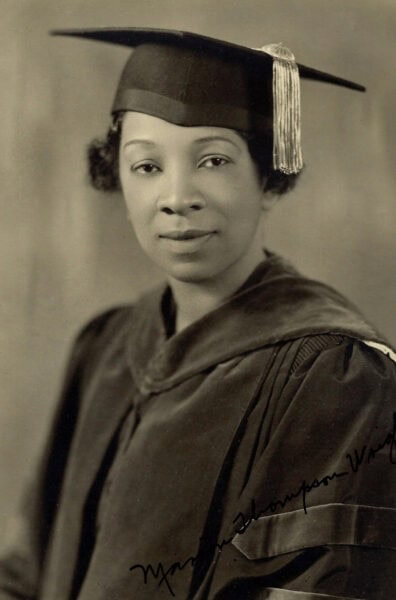
Marion Thompson Wright
Marion Thompson Wright’s sudden death at the age of 60 on October 26, 1962, marked the close of her long career at Howard University, where Wright’s zeal for education began early.
A native of Newark, New Jersey, she was born Marion Manola Thompson on September 13, 1902, the first of four children of Moses B. Thompson, a laborer, and Minnie B. Holmes Thompson, a domestic. She excelled at Newark High School, but she dropped out in her junior year to marry William Henry Moss, a laborer. The marriage resulted in two children, Thelma Mae Moss and James Allen Moss. The couple divorced in 1922 with Moss gaining full custody of their children. Wright would marry again in 1931, to Arthur Wright, a postal clerk; they divorced in 1953.
Wright elided her family background when she enrolled in Howard University in 1923, a deception that haunted her student life and that, if revealed, threatened her career at the school. Wright completed a BA in 1927 and an MA in 1928. After teaching at Howard for several years, she returned to Newark to work as a caseworker for New Jersey’s Relief Association in the 1930s. She earned a certificate at the New York School for Social Work in 1938. Fulfilling a long-cherished dream, Wright earned a PhD in history, mentored by the eminent social historian Merle Curti, at Columbia University–Teachers College in 1940. Her dissertation, The Education of Negroes in New Jersey, marked the first earned doctorate by a Black woman in the United States. Wright resumed teaching at Howard’s School of Education in 1939, securing tenure in 1946 and promotion to full professor in 1950.
Published by Columbia University Press in 1941, Wright’s study on Black education in New Jersey combined the histories of education and religion with slavery and Black-earned freedom. Her connections of abolitionism and the emergence of Black leadership anticipated the works of Benjamin Quarles, Ira Berlin, and innumerable others, and her synthetic history of Black New Jersey inspired scholars including Clement Price, Gilles Wright, and me. A fervent activist for school desegregation, Wright demonstrated in her historical research how much Jim Crow education hampered the growth of young Blacks, and she served in 1953 as a key researcher for the Brown v. Board of Education lawsuit that overturned school segregation in the United States.
In 1943, the Journal of Negro History published “New Jersey Laws and the Negro,” Wright’s study of state legislation affecting Blacks in slavery and freedom from 1664 to 1943. Her focus on law as an instrumental force in American social freedom predated other scholarship by decades. The Association for Negro Life and History awarded her the prize for best article published in the Journal of Negro History that year, besting such future luminaries as John Hope Franklin and Kenneth Stampp.
Wright went on to publish numerous articles on student guidance, women’s rights, juvenile delinquency, and educational theory, and was active in Black women’s and professional historical associations. She was book review editor for the Journal of Negro Education for 20 years, writing several lengthy review essays each year in addition to her sizable teaching and service load at Howard, where she also established the student counseling service in 1946.
Wright’s 1948 essay in the Journal of Negro History on Black suffrage in New Jersey, 1776–1865, reflected the aftermath of the enactment of the pathbreaking 1947 New Jersey Constitution that specifically barred discrimination by religious principles, race, color, ancestry, or national origins. Wright’s article revealed the extent of Black and women’s voting in New Jersey from the American Revolution until 1807. Her careful readings of convention notes, newspaper accounts, and political records were models for similar efforts regarding other states. Later, she completed an unpublished biography of Lucy Diggs Slowe, Howard’s pioneering dean of women.
Wright’s successful academic career masked personal tragedy. She remained estranged from her children until halting reconciliations occurred in the 1950s. Depression over her abandonment of her children in favor of an academic career preceded Wright’s suicide in 1962. Her son, James Allen Moss, earned a doctorate at Columbia University in 1953 and became a prominent scholar of Black Power. Today, the annual Marion Thompson Wright Lecture Series, established in 1981 at Rutgers University–Newark, honors her memory.
Graham Hodges
Colgate University
This work is licensed under a Creative Commons Attribution-NonCommercial-NoDerivatives 4.0 International License. Attribution must provide author name, article title, Perspectives on History, date of publication, and a link to this page. This license applies only to the article, not to text or images used here by permission.